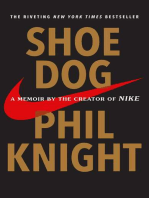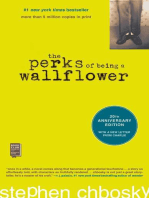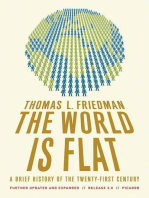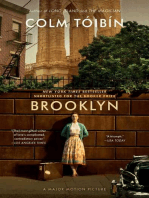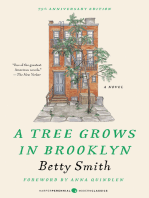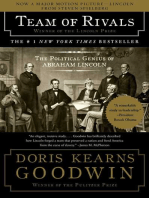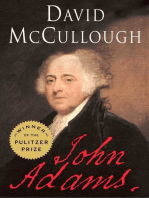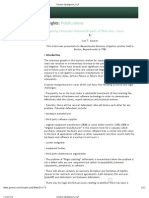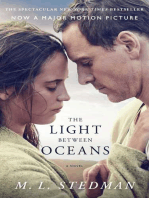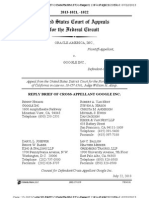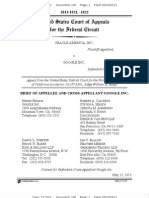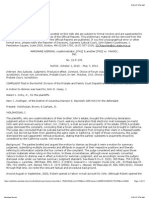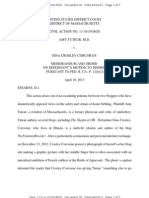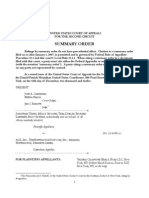0 ratings0% found this document useful (0 votes)
684 viewsLetter From Evans, Vol 3, No 1
Letter From Evans, Vol 3, No 1
Uploaded by
gesmerCopyright:
Attribution Non-Commercial (BY-NC)
Available Formats
Download as PDF or read online from Scribd
Letter From Evans, Vol 3, No 1
Letter From Evans, Vol 3, No 1
Uploaded by
gesmer0 ratings0% found this document useful (0 votes)
684 views20 pagesOriginal Title
Letter From Evans, Vol 3, No 1
Copyright
© Attribution Non-Commercial (BY-NC)
Available Formats
PDF or read online from Scribd
Share this document
Did you find this document useful?
Is this content inappropriate?
Copyright:
Attribution Non-Commercial (BY-NC)
Available Formats
Download as PDF or read online from Scribd
Download as pdf
0 ratings0% found this document useful (0 votes)
684 views20 pagesLetter From Evans, Vol 3, No 1
Letter From Evans, Vol 3, No 1
Uploaded by
gesmerCopyright:
Attribution Non-Commercial (BY-NC)
Available Formats
Download as PDF or read online from Scribd
Download as pdf
You are on page 1of 20
ET TE Re
Warren Bernhardt
Chuck Israels
Peter H. Larsen
Ron Nethercutt
Board of Advisors:
ABi-Monthly
Pre to
Dette
Bi rsee og
Bill Evans
SSCL
ame ea Us)
‘Sep/Oct, 1991 ISSN # 1056-4170
News
Tris issue could be described asan issue of discov-
cry. I have discovered several new jez pianists
‘who are saying something new. They are doing it
with varying degrees of success, but L admire their
‘will, determination, and their music.
‘Another delightful discovery isthe writing talent of LFE
sibscriber Ted Gioia, His approach to jazz writing is among
the best that Thave encountered. His insights and perceptions
are those of a musician who listens. His writing is clear,
concise and straightforward. Don't miss any opportunity to
read what this guy hes to say
mAs this issue goes to press, the Russian Military Estab-
lishment has taken over the goverment in that country and
isposcd its leader Mikhail Gorbachev. Bill Evans's mother
and Bill and Harry Evans felt a close
Kinship to macther Russia. Bill Evans refused ro do a coucert
tour in that country for political xeasons. Most jazz musicians
steer clear of polities, but Bill Evans was concerned about
these matter.
Twas talking to a local U.S.
Post Office employee recently
(where I spend 2 lot of time),
and noticed that East Germany
and West Germany were still
lisied as separate countries. He
‘explained that the U.S. Post OF
fice wasin the process of chang-
ing this designation to more
accurately reflect the present
and suggested that all mail to
‘either country simply te labeled
GERMANY. I joked with the
clerk, asking him if this was a
permanent change.
News...
Letters. .
Corrections j
Book Reviow-Tod Giol
In this issue:
Audio Reviews, Gioia, Hersch S
Music Printing Software Reviews. .
Bill Evens-Since We Met-Review . . -
"B Minor Waltz” - Jack Reilly .. . -
TRO now publication ad
Vol. 3, Number 1, Price $5.00
This issue bas the first majoraricte about mousic software.
Itis timely, since Thave received calls from subscribers and
others interested in what I use to publish the musical exam
ples in LFE. Four companies have been kind enough to
furnish review packages. I'm no MIDI-MAN, just an acous
tic bass player who needs to notate readable music in profes-
sional and educational contexts. I've reviewed these
packages from that perspective
fm In-the-Works Department
I've started on an index to LFE. Once completed, it will be
‘updated and printed regularly in the publication. Also, I'm
working on a complete list of music written by Bill Evans,
‘whether it has been published, and its carrent availability. I'l
include individual cones printed in antholo
books, both legitimate and illegitimate. The other day I found
my wife Ellen (a legit flutist and Associate Bitor of LFE)
playing Bill's “TT:T. Twelve Tone Tune.” She remarked
‘whata pleasure it was ta play 2 twelve fone row that was so
‘melodic, Bill was So dedicated to melody that the technical
sequizement of using all twelve notes in a row before repeat
inga note did nat impede his gift for melodic flow. It's great
tune, and it weaves an indelible tack in my brain just as the
more conventionally melodic
Waltz for Debby” of “Laurie.”
Coming soon t© these pages
will be an interview with Pat
fans, widow of Bill's brother
Harry, father of Debby in “Waltz
for Debby.” Thanks to LFF Beard
‘of Advisors member Ron Nether-
cet for this.
mt Renewals are coming in stead
ily, and many have been geverors
with gifts above and beyond the
subscription price. They are listed
elsewhere in this issue, Thanks
very much,
Letter from Evens, September/October, 1991
Tho Jazz Contral organization gave another tribute concert
to Bill Evans on Saturday, Aug. 17, 1991, at § PM at the
Musicians’ Union Building, Local 47, Ametican Federation of
Musicians in Hollywood, CA. This Concer is always sched
Uled on the Saturday evening closest to Bill's birthday, Aug,
16, 1929, Scheduled wo play were the Mike Melvoin Tio, the
Joanne Graver Trio, and fluglehomist Stacy Rowles. | coald
‘otattend this year. LFE subscriber and well known jazz writer
Scott Yenow, attended the concer and recently sent me a
review. It wll bein the next issue.
‘That evening was not without some musical rewards, iow-
ever as I was Incky enough to play in a band opposite Mel
“Torme and his trio. Former teaching associate, guitarist, pian
istextraordinate and friend, Jack Peterson, played piano inthe
Tobby, Jack and I worked together atthe University of North
Floida, Pianist and LFE contributor, Frank D. “Bubba” Kolb,
played inside with me on electronic instruments, That group
played the more mundane, popular dence music forthe con-
vention atlendees. 1's dirty job but someone tis to doit
Tt was a pleasure to hear Mel. This was my second time.
‘The first took place sbout Ld years ago with a big band lead
by Al Porcino. Mel sounded fine. Mel's book, Traps, The
Drars Wonder, The Life of Buda Rick (Oxford University
Press, $21.95, ISBN 0-19-S0738.0) i fresh off the press. Most
readets are protably aware ofthe famous tape that has cicu-
lated among musicians of Buddy fing one of his band mem-
‘bers, something be did with regularity. Beneath the difficult
personality was a prest musician and complex person. Though
tot within the scope of this publiation to review, it should
provide interesting reading and a good example of Mcl’s
Ierary sks.
‘Mel’s show was sort of an abbreviated, Me sings his hits
version. This performance was for @ convention of drug deal-
xs. | guess Fé better clarify that. The convention was an
‘organization ef actional drug store chains, Isuppoce Tmay got
Phone calls now fram some of my seedier acquaintances
saying, “Hey man, { dida'tnow we had a convention
Letters
A
Jaze 6, 1991
Deat Win,
AAs an Evans aficionado for over twenty years, as well as a
{ened of Bill's in the last few years of his life, Ifeel compelled
to respond to the disappointing and somewhat illogical review
by Sean Petrahn of “Solo Sessions, Vol. I” from the May/June
1991 Issue.
Primasily, [feel that Sean has misunderstood the “spirit”
of the recording and its value as a kind of “Porta of the artist
‘a8 4 young man" (apologies to James Joyce). The reviewer"s
remark that *we have no right to eavesdrop” shows a lack of
LETTER FROM EVANS is pubished six imes a year
‘at an annual subscription rato of $20.00 (oulk rate) in
the continental United States, $25.00 first class;
$25.00 (thid class) in Alaska, Hawaii, Canada, and
Mexico: The rate in all other countries is $95 (lunds
in US. dollars). Previous issues are available at
$7.00 each ($8.50 fcreign). The opinions expressed
horein are not necessarily those of the Pubishei/Edi-
tof, Win Hinkle, or the Board of Advisors. Leiters to
‘he oditor are weleomo on any subject. Advorising
\will be accepted from firms that nave @ product of
‘genuine inierest to the Bill Evans enthusiast. A rato
card ie available on request. Non-commercial
sources of Bill Evans materials may present notices
fot possible inclusion in LFE, The final determination
of suitability will be made at the sole discretion of the
Publishe:/Editor. The cover loge, based on a photo-
‘graph by Jim Marshall, was designed by Mike Ning
and is used by permission.
‘Board of Advisors:
Warren Bernhardt
Chuch Israels
Ren Nethercutt
Peter H. Larsen
Jack Reilly
Staft
Win Hinkle, Publisher/Editor
Ellen Hinkle, Editorial Assistant
Bolsy Hinkle, Production Assistant
‘Mr. MeGoo, Proofreader
Letter from Evans
Win Hinkle, Editor
2712 Cady Way
Winter Park, FL
32792-4856
USA.
Voice Phone (407) 678-7113
FAX (407) 678-7049
Letter from Evans-Japan
William Montgomery, Editor
Homat Orient #404
22 Iehibencho, Chiyoda-ku
Tokyo 102, Japan
Phone 011 813 237 1348
DISCLAIMER
The editor/publisher, writers, end members
of the Board of Advisors of LETTER FROM
EVANS have never knowingly endorsed or
promoted any illegal audio or video
recordings.
Letter from Evans, September/October, 1991
‘understanding in general of, firsly, how many releases were,
if you will, “unauthorized” by some artists (and released
posthumously) throughout the last two decades of jazz, and
secondly, the intrinsic merit of being able to hear Bill in raw
form, working it out on the spot. Itisarare glimpse into Bill’s
‘mind, very much like most of side two of the “Eloquence”
release on Fantasy, recorded in 1975. Lincr notes waiter Don
[Nelson wrote of those sessions, “They reveal Evans as the dual
person all artists are: the prober and the achiever,” and that,
“We have been able wo hear him musing over something not
yet within his grasp.” Pechaps Petrahn feels that the only
‘valuable work worth hearing from a master such as Billi that
which is polished and finished. With this atitede in mind, it
‘might follow that Sean's musical mind could never acceptsuch
milestone sessions as the Miles Davis January 1993 one with
young Sonay Rollins and Bird ontenor sizes. The A&R man
(iru Gitler) acknowledged that it was a bad day for everyone
involved, yet produced music of particular historical impor-
tance; or even Dean Bencderti's solo cxcerpts he recorded of
Bird playing “live” in the fortes. The history of recorded jazz
is filled with what could be perhaps considered “unacceptable”
performances (ky the likes of Petraln and others) but have, in
retrospect, become intimate peekings into the creative genius
‘of those who created them.
‘Scan is comect in saying that Bill would probably nothave
approved of this release, all the rmore <9 in light of his wlira-
perfectionist tendencies as a recording artist, which are well-
‘documented. I conversed with Bill myself several times about
thie back in the seventies, and this was while he played
‘oat-takes for me from the Columbia Bill Evans Album, George
Cleve, writing for thenotes for the Jncuition album wert so far
as tomuse about the possiblity of Bill releasing an album of,
all the takes of a given tune, humorously adding that it could,
‘be called Take Your Choice. Such was the sustaining interest
in all the unrcleased takes Cleve heard while attending those
Evars-Gomez duo sessions. Keepnews” comment that these
solo sessions are “remarkable recordings” remains tmue, de-
spite Mr. Petrahn's faulty reasoning. As a professional pianist
‘myself, | appreciate bearing Bill “naked and unashamed
‘you will — willing to take chances, knowing hie profession-
alism and depth of knowledge will make it worthwhile, even
ifbe is experimenting.
‘Some other observations: Sean’s statement thatthe open-
ing of "What Kind of Fool Am 17” sounds “as if he doesn't,
Jew the tune” is sheer absurdity and musically jgnorent as,
‘well. Bill's use of the first three notes of the melody, corning,
own a fourth each time to finally rest in E Major, sews the
‘mood and cteatcs a definite impressicnistic metif while using,
the sustain pedal. Sean thinks Bill’s wait the modulation to G
Major ("to get a groove going”) is somehow the pianist's
eficiency. I contend the deficiency is Petrakn's misunder
standing of Bill's musical tendencies and stylistic tools. There
are many tracks ia the Evans catalogue where Bill's tematic,
siatement is intentionally rubato, even “unrhythiic™ in the
sitict sense; thie was a device that, in my view, was one of
Bill's favorites: He allowed usto get inside the structure from
theoutside in, letting the Hstening “drink in” his rich harmoni
‘approach. It escapes me how anyone who loves Evans” music
‘could miss this
Tim glad that the reviewer found that Bill is “having fun
and has “complete control” of his harraonic vocabulary, re-
sgading the "My Favorite Things” wack, He then calls “Easy
to Love” as worth to the exquisite “When I Fall in Love,” but
Tean't kelp but remind the reader that Sean concludes the
review by saying, “I woulda’t buy this one, but I'll et you
decide.” T believe that should speak for itself in terms of
Petrahr’s consistency of thought. Then again, be remarks that
since the plano used on the date seems to need regulation and
‘new homrmers (“For this reason slone..”) he would not release
this record. I thank God that Petrain wes not the head of a
record corapany ia the sixties; we'd have precious few records
bby not only Bill, bur Barry Harris (the piano on the Preminado
LPs fat worse}, Monk, Red Gatland and others.
Petrahn talks about Bill's “technical perfection” (yet com-
plains of wrong notes in the Newly tune), and “total control”
and “spontaneous awareness of what every voice (sound) is
doing,” yethas the unmitigated gall to subjectively state that
‘New Jazz Conceptions was “mach more inventive onall evels
than this one.” With all due respect, perhaps Scan should not
beso arbitrary in his tastes ander listen moce deeply to Bll in
all is glorious stylistic periods before offering such black-
and-waite opinions, I am not stating that everything Bill ever
played was biiliant — surely there are references in much of
{juz literature to the problems of expressiveness during this
1962-63 period, especially the trio work — but I hear, like
Keepnews and critie Martin Williams, a probing, self-reveal-
ing and very private Bill Evans in this session that wams my
heart and makes me smile, Sean Pe:rabn’s remarks can never
Jessen the richness contained in this work and the valusble
ackition itis to Bill's legacy for me and many other pianists 1
know who have been touched by its magic.
‘Warm regards,
Jan R, Stevens
Sean’s rebuttal
Dear Mr. Stevens,
My thesis stil stands, When an artist seys “no” to a producer,
that producer must show respect for the integrity of the artist,
and bura the tapes!!!
| éonot apologize for the high standards by which I judge
Bill Evans, for Lhave to answer to myself, as well. Sigmund
Preud's legacy bac been grossly misinterpreted. He did not
‘mean that everybody “has the right to eavesdrop” on every
body else, His message was dirceted to the average, normal,
sane, individwalsheJshe should eavesdrop on their own uncon
scious mind in otder to better understand the belavior of their
‘conscious tind with all its shortcomings.
Page 3
You might also like
- The Subtle Art of Not Giving a F*ck: A Counterintuitive Approach to Living a Good LifeFrom EverandThe Subtle Art of Not Giving a F*ck: A Counterintuitive Approach to Living a Good LifeRating: 4 out of 5 stars4/5 (5936)
- The Gifts of Imperfection: Let Go of Who You Think You're Supposed to Be and Embrace Who You AreFrom EverandThe Gifts of Imperfection: Let Go of Who You Think You're Supposed to Be and Embrace Who You AreRating: 4 out of 5 stars4/5 (1107)
- Never Split the Difference: Negotiating As If Your Life Depended On ItFrom EverandNever Split the Difference: Negotiating As If Your Life Depended On ItRating: 4.5 out of 5 stars4.5/5 (886)
- Grit: The Power of Passion and PerseveranceFrom EverandGrit: The Power of Passion and PerseveranceRating: 4 out of 5 stars4/5 (598)
- Hidden Figures: The American Dream and the Untold Story of the Black Women Mathematicians Who Helped Win the Space RaceFrom EverandHidden Figures: The American Dream and the Untold Story of the Black Women Mathematicians Who Helped Win the Space RaceRating: 4 out of 5 stars4/5 (925)
- Shoe Dog: A Memoir by the Creator of NikeFrom EverandShoe Dog: A Memoir by the Creator of NikeRating: 4.5 out of 5 stars4.5/5 (545)
- The Hard Thing About Hard Things: Building a Business When There Are No Easy AnswersFrom EverandThe Hard Thing About Hard Things: Building a Business When There Are No Easy AnswersRating: 4.5 out of 5 stars4.5/5 (353)
- Elon Musk: Tesla, SpaceX, and the Quest for a Fantastic FutureFrom EverandElon Musk: Tesla, SpaceX, and the Quest for a Fantastic FutureRating: 4.5 out of 5 stars4.5/5 (476)
- Her Body and Other Parties: StoriesFrom EverandHer Body and Other Parties: StoriesRating: 4 out of 5 stars4/5 (831)
- The Emperor of All Maladies: A Biography of CancerFrom EverandThe Emperor of All Maladies: A Biography of CancerRating: 4.5 out of 5 stars4.5/5 (274)
- The Little Book of Hygge: Danish Secrets to Happy LivingFrom EverandThe Little Book of Hygge: Danish Secrets to Happy LivingRating: 3.5 out of 5 stars3.5/5 (419)
- The World Is Flat 3.0: A Brief History of the Twenty-first CenturyFrom EverandThe World Is Flat 3.0: A Brief History of the Twenty-first CenturyRating: 3.5 out of 5 stars3.5/5 (2272)
- The Yellow House: A Memoir (2019 National Book Award Winner)From EverandThe Yellow House: A Memoir (2019 National Book Award Winner)Rating: 4 out of 5 stars4/5 (99)
- Devil in the Grove: Thurgood Marshall, the Groveland Boys, and the Dawn of a New AmericaFrom EverandDevil in the Grove: Thurgood Marshall, the Groveland Boys, and the Dawn of a New AmericaRating: 4.5 out of 5 stars4.5/5 (270)
- The Sympathizer: A Novel (Pulitzer Prize for Fiction)From EverandThe Sympathizer: A Novel (Pulitzer Prize for Fiction)Rating: 4.5 out of 5 stars4.5/5 (122)
- Team of Rivals: The Political Genius of Abraham LincolnFrom EverandTeam of Rivals: The Political Genius of Abraham LincolnRating: 4.5 out of 5 stars4.5/5 (235)
- A Heartbreaking Work Of Staggering Genius: A Memoir Based on a True StoryFrom EverandA Heartbreaking Work Of Staggering Genius: A Memoir Based on a True StoryRating: 3.5 out of 5 stars3.5/5 (232)
- On Fire: The (Burning) Case for a Green New DealFrom EverandOn Fire: The (Burning) Case for a Green New DealRating: 4 out of 5 stars4/5 (75)
- Litigating Computer Breach of Warranty CasesDocument12 pagesLitigating Computer Breach of Warranty CasesgesmerNo ratings yet
- The Unwinding: An Inner History of the New AmericaFrom EverandThe Unwinding: An Inner History of the New AmericaRating: 4 out of 5 stars4/5 (45)
- 13-07-22 Google Reply Brief in Oracle's Copyright AppealDocument31 pages13-07-22 Google Reply Brief in Oracle's Copyright AppealFlorian MuellerNo ratings yet
- Oracle Response and Reply BriefDocument84 pagesOracle Response and Reply BriefgesmerNo ratings yet
- Google Brief in Oracle's Copyright AppealDocument97 pagesGoogle Brief in Oracle's Copyright AppealFlorian MuellerNo ratings yet
- 13-02-11 Oracle V Google Appeal BriefDocument227 pages13-02-11 Oracle V Google Appeal BriefFlorian MuellerNo ratings yet
- AMD v. Feldstein (D. Mass. May 15, 2013)Document26 pagesAMD v. Feldstein (D. Mass. May 15, 2013)gesmerNo ratings yet
- Anti-Piracy Law Group Demand LetterDocument2 pagesAnti-Piracy Law Group Demand LettergesmerNo ratings yet
- Aereo - Memo in Support of Defendants' Motion To DismissDocument23 pagesAereo - Memo in Support of Defendants' Motion To DismissgesmerNo ratings yet
- Aereo Complaint For Declaratory Judgment - FINAL FILEDDocument89 pagesAereo Complaint For Declaratory Judgment - FINAL FILEDJordan CrookNo ratings yet
- 93A Opinion in Baker v. Goldman SachsDocument41 pages93A Opinion in Baker v. Goldman SachsgesmerNo ratings yet
- Judge's Order in Craigslist v. 3taps and Padmapper CaseDocument27 pagesJudge's Order in Craigslist v. 3taps and Padmapper Casemeghank_5No ratings yet
- Ajemian v. Yahoo, No. 12-P-178. Norfolk. October 1, 2012. - May 7, 2013Document10 pagesAjemian v. Yahoo, No. 12-P-178. Norfolk. October 1, 2012. - May 7, 2013Venkat BalasubramaniNo ratings yet
- Redigi Summary Judgment TranscriptDocument61 pagesRedigi Summary Judgment TranscriptgesmerNo ratings yet
- Tuteur v. Crosley-CorcoranDocument7 pagesTuteur v. Crosley-CorcorangesmerNo ratings yet
- Capitol Records v. ReDigi JudgmentDocument18 pagesCapitol Records v. ReDigi JudgmentMacRumorsNo ratings yet
- Billboard White Paper 2012Document6 pagesBillboard White Paper 2012gesmerNo ratings yet
- Tasini v. AOL (2d Cir. Dec. 12, 2012Document5 pagesTasini v. AOL (2d Cir. Dec. 12, 2012gesmerNo ratings yet
- Invidia, LLC v. DiFonzoDocument5 pagesInvidia, LLC v. DiFonzogesmerNo ratings yet








